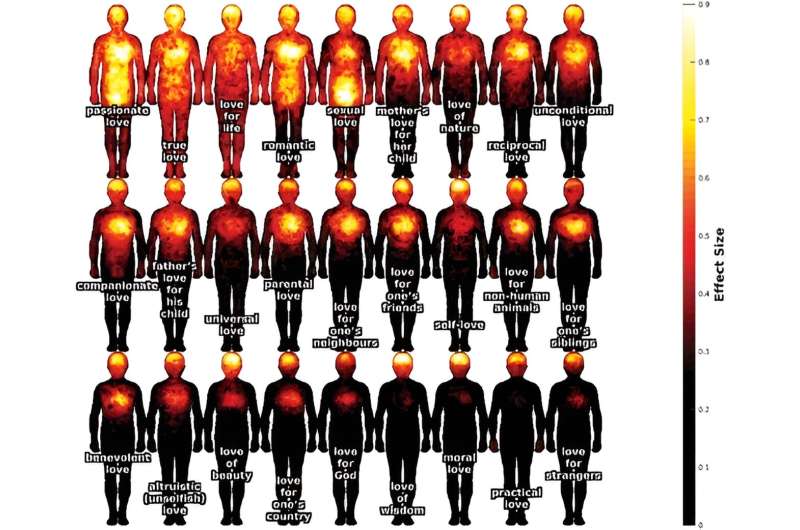This article has been reviewed according to Science X's editorial process and policies. Editors have highlighted the following attributes while ensuring the content's credibility:
fact-checked
trusted source
proofread
New research sheds light on where and how we feel different kinds of love

Researchers at Aalto University have made a map of where in the body different types of love are felt and how strongly they are experienced.
"It was noteworthy, though not very surprising, that the types of love associated with close relationships are similar and are the most strongly experienced," says philosopher Pärttyli Rinne, who coordinated the study. Doctoral researcher Mikke Tavast analyzed the data, while researcher Enrico Glerean developed the research methods. The project was jointly initiated by Rinne and Professor Emeritus Mikko Sams.
The team surveyed participants about how they experienced 27 different types of love, such as romantic love, sexual love, parental love, and love for friends, strangers, nature, God, or themself. The team asked participants where they felt the different types of love in their body and how intense the feeling was physically and mentally.
Their findings, published in Philosophical Psychology, suggest that the different types of love form a continuum from weaker to stronger. All of the types were felt strongly in the head, but they differed throughout the rest of the body—some spread only to the chest, while others were felt all over. The strongest forms of love were felt most widely throughout the body.
To build the map, the researchers collected data from hundreds of participants through an online survey. Most of the responses were from young women in higher education. Participants were asked to color in a body silhouette to show where they felt each type of love. They were also asked about how they felt the different types physically and mentally, how pleasant the feeling was and how it was associated with touch. Finally, they were asked to rate the closeness of the types of love.
"Love between persons is divided into sexual and non-sexual. The types of love that are particularly close to each other are those that have a sexual or romantic dimension," says Rinne.
"It was also interesting to find a strong correlation between the physical and mental intensity of the emotion and its pleasantness. The more strongly a type of love is felt in the body, the more strongly it's felt in the mind and the more pleasant it is," adds Rinne.
Rinne says that the team were intrigued by the fact that all the different types of love are felt in the head. "When we move from more strongly experienced types of love to less strongly experienced types, the sensations in the chest area become weaker. It may be that, for example, love for strangers or wisdom is associated with a cognitive process. It may also be that there are pleasant sensations in the head area. This is something that should be investigated further," says Rinne.
Rinne also notes that there are cultural differences in love and that the demographics of the study group are linked to the experience of love. "If the same study were done in a highly religious community, love for God might be the most strongly experienced love of all. Similarly, if the subjects were parents in a relationship, as in our ongoing brain study project, love for children could be the strongest type of love," says Rinne.
More information: Pärttyli Rinne et al, Body maps of loves, Philosophical Psychology (2023). DOI: 10.1080/09515089.2023.2252464




















